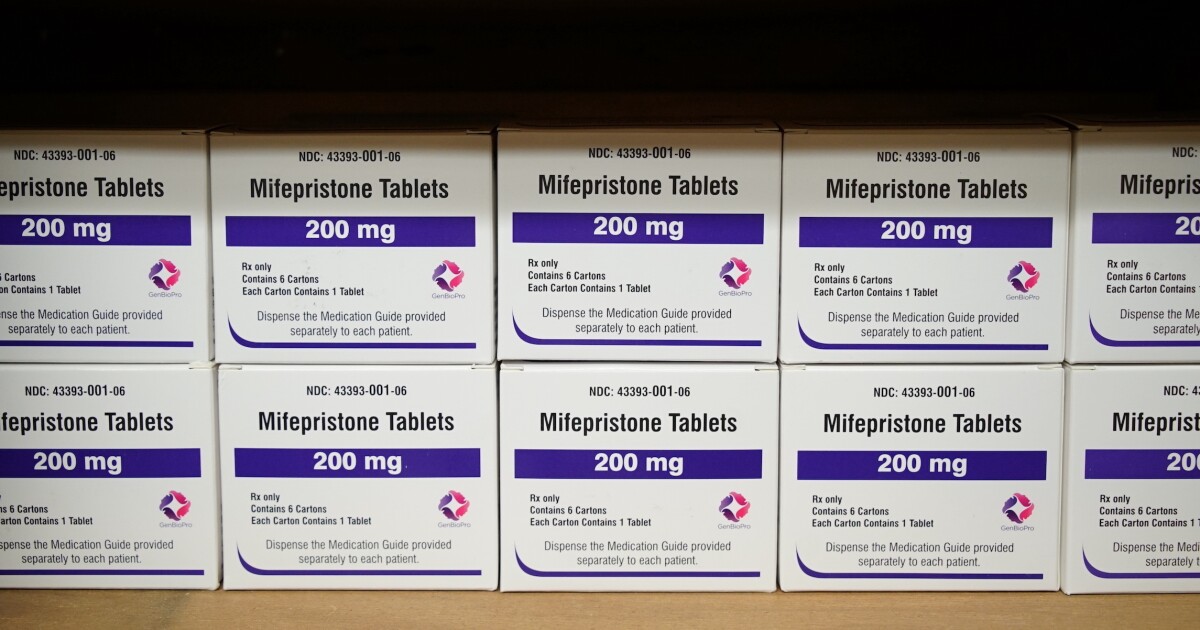

Anti-abortion advocates are gearing up to fight President Joe Biden’s pledge to secure access to abortion-inducing medication by exercising his federal authority over states that have restrictions in place.
Biden signed an executive order Friday aimed at bolstering access to abortion now that the Supreme Court ruled in the case Dobbs v. Jackson Women’s Health Organization that the Constitution does not guarantee the right to abortion. One of his orders vaguely directed the Department of Health and Human Services to “protect and expand access to abortion care, including access to medication that the [Food and Drug Administration] approved as safe and effective over twenty years ago,” according to a White House summary.
CONGRESS LAUNCHES INVESTIGATION OF PERIOD-TRACKING APPS OVER POST-ROE PRIVACY CONCERNS
“Consider the challenge accepted, court. I’m asking the Justice Department to do everything in their power to protect these women seeking to invoke their rights,” Biden said. “To protect a woman’s right to the FDA-approved medication that’s been available for over 20 years.”
The Justice Department has already broached the topic of restrictions in many red states on the use of the abortion-inducing medication regimen that uses mifepristone and misoprostol. Attorney General Merrick Garland asserted soon after the Supreme Court’s ruling in Dobbs last month that “states may not ban Mifepristone based on disagreement with the FDA’s expert judgment about its safety and efficacy.”
But Roger Severino, the vice president of domestic policy at the conservative Heritage Foundation and the former director of HHS’s Office for Civil Rights under President Donald Trump, said that red states are not in disagreement with the FDA’s judgment about safety and efficacy. Therein lies the problem for the Biden administration’s argument.
“The states that are protecting unborn life concede that abortion drugs are exceedingly good at what they’re designed to do,” Severino told the Washington Examiner. “So they are not questioning the efficacy of these drugs based on the FDA judgment. They’re using the FDA findings to say yes, these drugs we agree do kill unborn life. That’s what they’re designed to do. And that’s why they should not be used in those pro-life states.”
Garland’s preemption argument, couched in the Constitution’s supremacy clause that says federal law supersedes conflicting state laws, is expected to become the centerpiece of federal litigation. Anti-abortion groups believe they can rebut the administration’s argument.
“They’re not banning drugs. They’re banning using the drugs to kill people,” said Kristen Day, the executive director of Democrats for Life of America. “The death penalty is illegal in lots of states, but the medication used to kill people is still legal. And so those states make a decision not to kill people with the death penalty.”
Ten states have already banned abortions either in almost all cases or after six weeks of pregnancy. Medication abortion, which the FDA deems safe and effective when taken within the first 10 weeks of pregnancy, falls under the bans.
“They can say that these are legal drugs. It doesn’t mean that they can be legal for a certain procedure. So if abortion is prohibited in these states because it’s considered murder, the drugs could still be legal, but they just can’t be used to kill a baby,” Day said.
Anti-abortion advocacy giant Susan B. Anthony Pro-Life America has already pledged to fight the Biden administration’s executive order in court alongside leaders in red states and partners in Congress.
“Biden and the Democrats are failing on policy across the board, so they’re caving to the abortion industry and grasping at straws,” said SBA Pro-Life America’s Vice President of State Affairs Stephen Billy. “Each of their proposals presents questions on the legal authority to act, and we will work with partners at the federal level and in the states (or Congress and Gov/AGs) to fight back against these extreme abortion-until-birth policies.”
Medication abortions are the most common types of abortions performed in the United States and can be taken in the privacy of one’s own home. The first drug in the medication course, mifepristone, blocks the hormone progesterone, without which the pregnancy cannot continue in the uterus. Between 24 and 48 hours later, the patient takes misoprostol, which causes cramping and bleeding to empty the uterus.
CLICK HERE TO READ MORE FROM THE WASHINGTON EXAMINER
The FDA has made it easier for women to get the medication prescribed through telehealth services and receive it in the mail, though the delivery of the pills in red states has been restricted. Women seeking a medication abortion must do so in a state where abortion is legal, such as Colorado, and pick it up at an address in that state before they can return to their home state, such as Texas, and take the pills in private.







